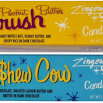A new study revealed that trapped apple juices beneath a caramel coating is a perfect bacteria breeding ground and can more quickly become contaminated with listeria.
"The temperatures-and sticks-seemed to play a role in listeria growth. The refrigerated apples without sticks had no listeria growth at all," Time reported. But caramel apples with sticks stored at room temperature had bacteria that increased 1,000-fold in three days."
The study, entitled "Growth of Listeria monocytogenes within a Caramel-Coated Apple Microenvironment," also revealed that apples without sticks stored at the same temperature also had bacteria growth, however at a slower pace. The refrigerated apples with sticks had no listeria growth for the first week, but they had some growth over the next few weeks.
The study authors, which include Kathleen A. Glass, Max C. Golden, Brandon J. Wanless, Wendy Bedale and Charles Czuprynski, even claimed that shoving a stick into the apple causes some apple juice to seep out into the coating of caramel. In other words, it is a good environment for bacteria to grow.
Moreover, the researchers suggested that their findings can help inform caramel apple manufacturers of the best practices to avoid bacterial growth. The also warned caramel apple fans to keep an eye out for fresh versions, or at least the refrigerated kind.
It is not the first time that listeria outbreak has been linked to caramel apples. As a matter of fact, there were tallied seven deaths and 35 sicknesses in 2014 due to the disease.
The researchers of the new study chose four of the listeria strain involved in the outbreak and coated them on Granny Smith apples. Afterwards, they punctured half of the apples with stems and dipped all of them in caramel. The apples were either stored at 77 degrees Fahrenheit, which is around room temperature, or in a fridge at 44.6 degrees Fahrenheit.









